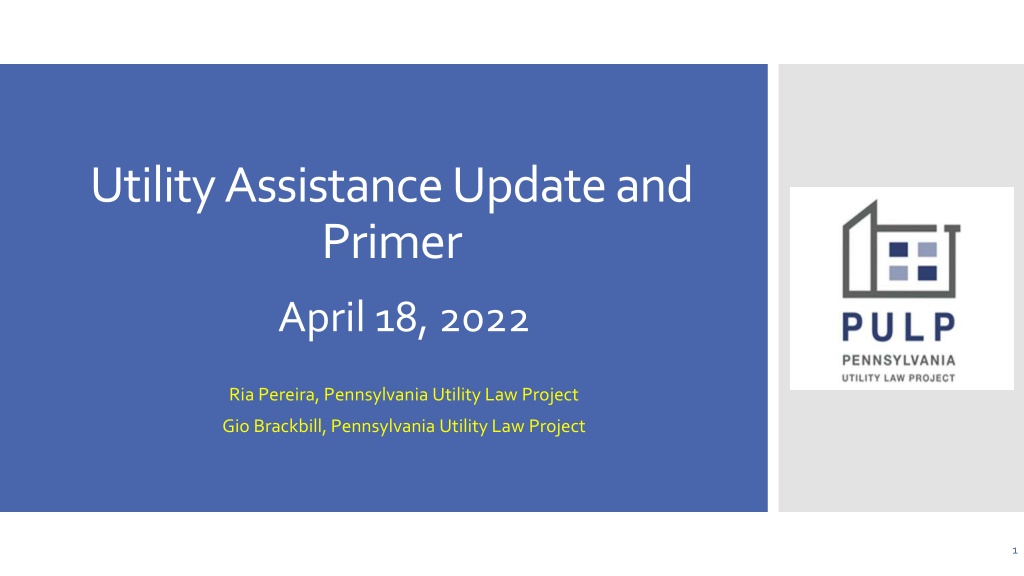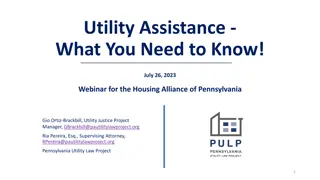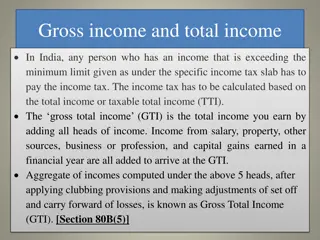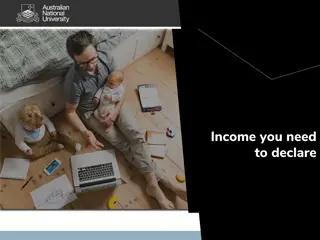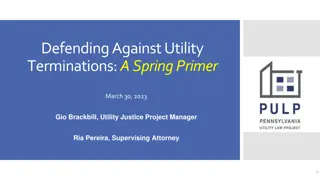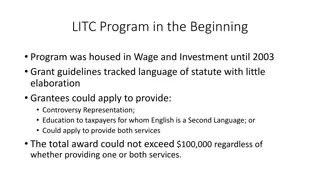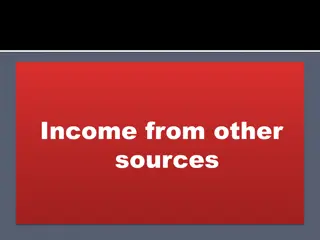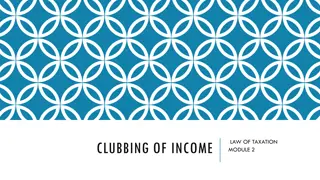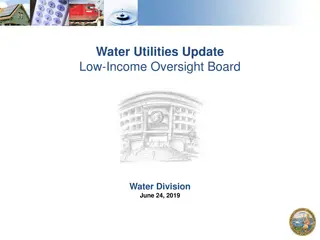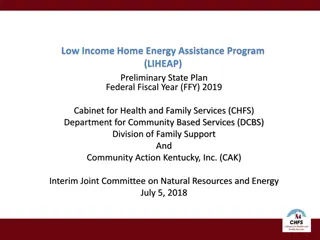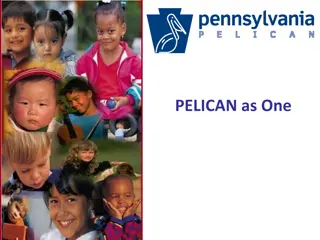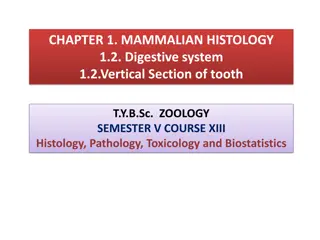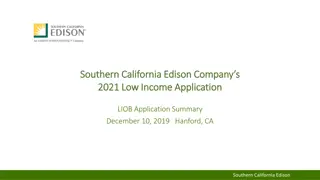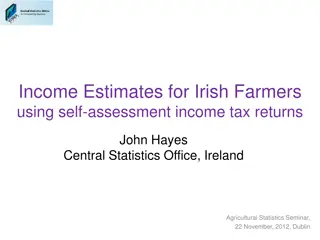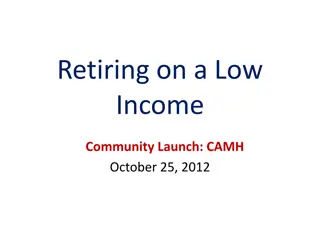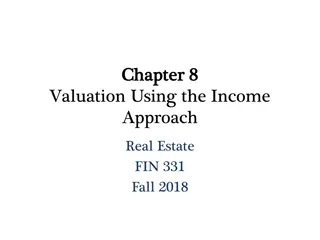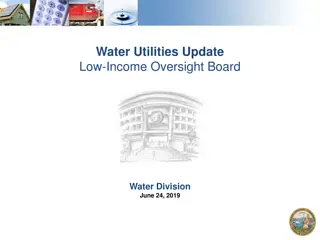Utility Assistance Update and Primer - PULP Focus on Low-Income Residential Utility in Pennsylvania
Today's webinar presented by Pennsylvania Utility Law Project (PULP) focused on LIHEAP programs, tools for preventing termination, and special protections for utility customers. It covered the Winter Moratorium ending, LIHEAP basics, eligibility criteria for cash grants, and more to assist low-income households with utility and energy affordability in Pennsylvania.
Download Presentation

Please find below an Image/Link to download the presentation.
The content on the website is provided AS IS for your information and personal use only. It may not be sold, licensed, or shared on other websites without obtaining consent from the author. Download presentation by click this link. If you encounter any issues during the download, it is possible that the publisher has removed the file from their server.
E N D
Presentation Transcript
Utility Assistance Update and Primer April 18, 2022 Ria Pereira, Pennsylvania Utility Law Project Gio Brackbill, Pennsylvania Utility Law Project 1
The Pennsylvania Utility Law Project (PULP) Focus: low income residential utility and energy affordability in Pennsylvania. Represents interests of low income, residential utility consumers statewide. Training, technical assistance, and support to legal aid and nonprofit community groups across Pennsylvania. 2
Todays Webinar: LIHEAP 2021-2022 Temporary Relief Programs Universal Service Programs Tools for Preventing Termination and Restoring Service Special Protections for Utility Customers Agenda / Introduction 3
The Winter Moratorium has ended Terminations began as of Monday, April 4 Low income households are protected from shutoff in the winter (December 1 to March 31). 250% of the Federal Poverty Guidelines (FPL) or below. Applies to gas, electric, and heat-related water service. e.g. radiator heating system, which requires water No guarantee of restoration if service is already off. Winter Moratorium 4
Low Income Home Energy Assistance Program (LIHEAP) 5
6 Program Basics Administered through DHS. Season ends May 6, 2022. Types of Assistance: Cash Grant (minimum $500) Crisis Grant (up to $1200 may receive multiple grants) Crisis/Interface Weatherization (DCED - emergency heater repair/replacement) Apply at County Assistance Office (CAO) or through COMPASS. For furnace repair / replacement - Apply at CAO, but local WAP agency will perform the work. Low Income Home Energy Assistance Program (LIHEAP)
Eligibility: Cash Grant 1. Household Income (150% FPL or below) Income measured as the month before OR the 12 months before the application, whichever benefits the client. 2. Home Heating Responsibility Customer is responsible for paying for the main source of heat (primary or supplemental). Utility companies often have direct communication with CAO to verify heating responsibility. Provide landlord verification or lease showing responsibility for main source of heat through rent (only 50% of cash grant). 3. Residency Household members permanently reside in PA. Recreational vehicles (campers / RVs) may qualify, if the resident resides in a licensed facility year-round. LIHEAP Cash 7
Eligibility: Crisis Grant 1. Household Income 2. Home Heating Responsibility 3. Residency 4. Actual or imminent home heating emergency Crisis may be shown by: Termination notice 15 days of fuel or less (oil/propane/wood/coal) 5. Grant will resolve the crisis A utility may accept LESS than the total amount owed to resolve the crisis but you have to ask! LIHEAP Crisis 8
Furnace Repair / Replacement Emergency repair or replacement of inoperable heating system. Heating system must have been operable within the last two years. Home may not have been purchased without an operable heating system. Available Benefits: Repair heating system Loan auxiliary heater Repair gas or other fuel lines Replace unrepairable heating systems Repair hot water heating system Heating system pipe thawing service Repair broken windows Provide blankets LIHEAP Crisis Interface Program 9
Certain lawfully admitted non-citizens are eligible to receive LIHEAP No 5-year bar. Must meet other LIHEAP eligibility requirements. PUBLIC CHARGE RULE DOES NOT APPLY TO LIHEAP. Special Issue: Immigrant Eligibilityfor LIHEAP (B-8) Eligible Non-Citizens Include: Lawful permanent residents Asylees Refugees Parolees (for at least 1 year), certain conditional entrants Cuban/Haitian entrants Non-citizens who (or whose child or parent) have been battered or subjected to extreme cruelty in the United States Iraqi or Afghan Special Immigrants 10
Ineligible adults with eligible household members can apply for LIHEAP. Special Issue: Immigrant Eligibilityfor LIHEAP Ineligible adult s income counts, but ineligible individuals do not count for household size for purpose of determining eligibility. 11
Special Issue: Immigrant Eligibility forLIHEAP ENERGY ASSISTANCE AFFIDAVIT 12
Provide Social Security numbers for all household members or complete the Energy Assistance Affidavit in the Certification section on page 3. Send proof of immigration status if you are a non U.S. citizen. (B-27) LIHEAP Application Checklist If you rent with heat included, send a copy of your lease or a signed, written statement from your landlord explaining how you pay for heat and the type of heat used. If you pay for heat, send a bill for your main heating source. Attach a copy of your utility bill dated within 2 months of the date you submit your application. For other fuels provide a bill / receipt of a purchase from January of the previous heating season to present. If you would like payment sent to your supplemental or secondary heating provider, enclose a copy of your main AND supplemental / secondary heating bills. 13
Send proof of all household income. Example: If you apply in April and are sending: a) one month of income send proof for March, the month prior to application. b) 12 months of income send proof for February of the previous year through March of the current year. PROOF INCLUDES PAY STUBS, AWARD LETTERS, EMPLOYER STATEMENTS, ETC. If an applicant is having difficulty obtaining proof of income, they can request assistance from the County Assistance Office! LIHEAP Application Checklist (Continued) If you have no income or if your income is less than the cost of your monthly basic living needs, send a statement explaining how your household pays for basic living needs (food, rent, etc.) Sign and date your application. Mail your completed application and all documents to your local County Assistance Office. If you are not sure where that is, call 1- 866-857-7095. 14
DCED launched a new pilot program to provide furnace maintenance service to households that received LIHEAP crisis interface (emergency furnace repair) last year or this year. Funded with $20 million allocated from DHS to DCED for weatherization, as part of the supplemental LIHEAP funds. Benefits include: Furnace cleaning, testing, replacement parts / filters Health / safety inspections Education and instruction Installation of basic efficiency and weatherization measures, as well as programmable thermostat Clean and Tune Pilot Program Contact your local Weatherization Assistance Program (WAP) provider or local County Assistance Office (CAO) for more information or to apply. https://dced.pa.gov/housing-and-development/weatherization/agency-list/ 15
Temporary COVID Relief& Other Federal Programs 16
Program Opened JANUARY 4, 2022. Low Income Household Water Assistance Program (LIHWAP) Eligibility 150% FPL Water / wastewater responsibility At risk of termination / service off Utility agrees to maintain service for minimum 90 days after grant received Benefits Up to $2,500 for water, AND Up to $2,500 for wastewater 17
Temporary COVID-Related Relief Emergency Rental and Utility Assistance Program (ERAP) Renters at or below 80% Area Median Income (AMI). Some counties are running out of funds from Phase I. Phase II is being launched in several counties with a new round of funding though some counties are fully spent! Often referred to simply as rental relief, many eligible renters may not be aware that they can get help with utilities, even if they ve kept up with rent. Temporary Relief Programs PA Homeowners Assistance Fund Opened Feb. 1, 2022 Homeowners at or below 150% AMI. Primarily for mortgage and other related costs. Up to $3,000 per household for delinquent utility bills. 18
Telecommunication /Broadband 19
https://www.usac.org/lifeline/ Benefits: $9.25 monthly subsidy for telephone, broadband, or bundled service.** Subsidy cannot pay for equipment, but some providers offer free phone. Benefit is portable to other providers. Lifeline One subsidy per household (defined as an economic unit). Eligibility: Income at or below 135% FPL, or categorical eligibility. SNAP, Medicaid, SSI, Public Housing, or Veteran Pension/Survivor Benefits The FCC has only indicated that they will maintain voice-only Lifeline support until 12/1/2022. This may negatively impact over 10 percent of all Lifeline enrollees who utilize voice-only services. https://www.benton.org/blog/lifeline-needs-lifeline 20
https://www.fcc.gov/acp Benefits: Up to $30 / month broadband subsidy. Some providers: $100 device discount, with $10-$50 co- payment. Eligibility: Households with incomes at or below 200% FPL; Households enrolled in SNAP, Medicaid, Federal Public Housing Assistance, SSI, WIC, or Lifeline; Households participating in certain Tribal programs; Households that include a member who is approved to receive free or reduced-price school lunch or breakfast; Pell Grant recipient; A person who participates in an internet provider s low-income program. Affordable Connectivity Program (ACP) 21
Universal Service Programs 22
Customer Assistance Programs (CAPs) Available to customers of large, regulated gas and electric companies. Some regulated water companies (Aqua, Pa. American, PWSA, and PWD) offer assistance programs as well. Customer Assistance Programs (CAPs) Benefits: Reduced rates / lower monthly payments. Past debt (arrearage) frozen. Arrearage forgiveness earned over time. Eligibility Requirements: Annual gross household income is at or below 150% FPL. Payment troubled. Periodic income verification. *May ask for Social Security #, but it is not required 23
Hardship Fund Programs Benefit Cash grant, typically up to $500 to resolve crisis. Eligibility and program terms vary by utility Hardship Funds Typical terms include: 200% FPL or below (some up to 300% FPL) Recent payments / Attempts to make payments These good faith payment requirements vary, but may be waived if requested often requires advocacy. Temporary hardship Grant must resolve the problem 24
Low Income Usage Reduction Program (LIURP) Low Income Usage Reduction Program (LIURP) Benefits Low Income Usage Reduction Program (LIURP) Energy audit Appropriate energy conservation measures High efficiency refrigerators/heating system upgrades / appliances Insulation / weatherization LEDs/power strips/etc. Eligibility Income at or below 150% or 200% FPL (depending on utility) High usage Landlord approval *CAP Customers may be required to participate in LIURP
CARES The program is targeted to customers who: Are having trouble paying their bill, and Have short term problems that are causing the inability to pay. CARES Offers several types of services: Referrals to social service agencies, Budget counseling, and Special arrangements for bill payment. Advocacy Tip: CARES is a little-used program, and the utility has wide discretion to resolve the customer issue. 26
Termination and Reconnection 27
Be proactive! It is better to try to work with the utility than ignore the problem. Pay what you can, when you can to establish positive payment history. Contact utility and provide income information. Apply for all available assistance programs. Determine whether special protections apply: Medically vulnerable consumers Victims of domestic violence Tenants General Advice to Clients Request an affordable payment arrangement. File a dispute with the utility and/or the Public Utility Commission. Last resort: seek bankruptcy. www.palegalaid.net/find-legal-help 28
Terminations may only occur Monday Thursday No Friday Terminations Occur because of nonpayment of undisputed delinquent account. Failure to: comply with terms of payment agreement. complete security deposit. permit access to equipment. Termination Rules Notice Requirements Written Notice - at least 10 days before termination. Notice effective for 60 days. Personal Contact - 3 days prior to termination, utility must attempt to contact customer in person, by phone, or electronically through email/text. Customer must AFFIRMATIVELY CONSENT to receive notice electronically. (consent is often obtained when the customer signs up for service). Last Knock Rule must attempt personal contact at the residence immediately prior to termination. 29
Payment Arrangements An agreement whereby a customer who admits liability for billed service is permitted to amortize or pay the unpaid balance of the account in one or more payments. Do not admit liability unless you know what you owe! Do not agree to a payment arrangement that you cannot afford to pay. Utility Issued Utilities have discretion to offer as many payment arrangements as they want for any length of time. Payment Arrangements PUC Issued 66 Pa. C.S. 1405 Current customers (including within 30 days of service term) <150% FPL = 5 year payback timeframe The PUC cannot require a utility to enter into a second payment arrangement absent extraordinary circumstances. 66 Pa. C.S. 1407 (Restoration Payment Arrangement) Applicants for service (those who have been without service for 30 days or longer) trying to reconnect at same address Reconnection fee (cost-based) < 150% FPL = 24 months 30
Payment Arrangement Exceptions PFA / Other Order: An outstanding residential account with the utility may be amortized over a reasonable period of time. Factors to be taken into account include: the size of the unpaid balance; the ability of the applicant to pay; the payment history of the applicant, and the length of time over which the bill accumulated. 52 Pa Code Section 56.285 Payment Arrangements CAP Arrears Debt accumulated on discounted bills while in CAP are not eligible for a payment arrangement from the PUC; however, the customer or applicant is typically able to pay ONLY their missed CAP payments to be reinstated into the program. Reinstatement in CAP should re-freeze the non-CAP debt and allow forgiveness over time. 31
Assistance Programs CAP, Hardship Funds, LIHEAP Payment Arrangements Protections for Customers with PFA or Other Court Order Cannot be charged for debt accrued in someone else s name even if they lived at the home when debt accrued. Additional / longer payment arrangements Additional notice of termination Tools forPreventing Utility Termination Medical Certificates Winter Moratorium Households with income at or below 250% FPL cannot be terminated from December 1 March 31. *Not a guarantee to have service restored if already off! 4-Year Rule Arrears over 4 years old cannot form the basis of termination. Tenant Rights & Protections Dispute Process File a Complaint Bankruptcy 32
Connecting / Reconnecting to Service 33
A customer can be charged up to 1/6thof the estimated annual bill (about 2 months). Utilities must provide customers with 90 days to pay the full deposit (50/25/25). Deposits may be held until timely payment established (paying in full and on time for 12 consecutive months. 1404(c)) Security Deposits 34
Security Deposit Exceptions / Waivers CAP-Eligible Below 150% FPL Must provide proof of income 66 Pa. C.S. 1404(a.1) Security Deposit Waiver PFA / Other Order (If Not Low Income): Waiver if customer can establish creditworthiness Employment, past residences, letters of reference, credit report. 52 Pa. Code 56.282, 56.283 Third Party Guarantor 35
No Security Deposit for CAP-Eligible Households Not required to actually enroll in CAP to waive security deposit but may be required to provide proof of income. Protections for Customers with PFA or Other Court Order Cannot charge victim for debt accrued in someone else s name, even if they lived at the residence when the arrears were accrued. Flexible payment arrangements based on individual facts and circumstances. Toolsfor Connecting/ Reconnecting Service 4-Year Rule Debt more than 4 years old cannot be required to be paid as a condition to providing service. Utility-Issued Payment Arrangements Utilities have broad discretion to enter into any number of payment arrangements for any length of time. If utility refuses to issue a payment arrangement, client can go to PUC for PUC- issued payment arrangement. PUC-Issued 1407 Payment Arrangement (for Service Restoration) 150-300% FPL - 12 months 150% FPL or below - 24 months No payment arrangement if defaulted on two or more arrangements for the same balance. 36
Special Protections for Utility Customers 37
Victims of Domestic Violence Customers with Serious Illnesses / Medical Conditions Tenants Special Protections for Utility Customers 38
Must provide utility with a copy of PFA or other court order showing clear evidence of domestic violence. A victim of domestic violence with a PFA or other court order may NOT be terminated for nonpayment for residential service already furnished in the names of persons other than the customer 52 Pa. Code 56.323 Cannot charge victim debt accrued in someone else s name, even if they lived at the residence when the arrears were accrued. Protections for Victims of Domestic Violence Flexible payment arrangements based on individual facts and circumstances. Additional Notice for Customers with PFA / Court Order Attempted personal contact immediately preceding termination. If no personal contact, notice is posted at the property and termination is delayed for 48 hours. 39
Medical Certificates A household may obtain a medical certificate to stop termination if a household member has a serious illness OR a medical condition which requires utility service to treat their illness. Examples: asthma requires air conditioning in summer / diabetes requires refrigeration for medication). A medical professional not the utility gets to decide which conditions qualify. Medical Certificates A medical certificate stops termination for 30 days. A customer may submit a new certificate every 30 days if they pay all current charges by the due date. A customer may renew medical certificates two times (90 days of protection) even if they do not pay current charges by due date. 40
Pennsylvania has parallel statutes permitting continued service: Discontinuance of Service to Leased Premises Utility Service Tenants Rights Act USTRA Also known as Subchapter B 68 P.S. 399.1-.18 Tenant Protections 66 Pa. C.S. 1521-33 By its terms, applicable to municipal utilities providing service within their corporate limits i.e., utilities that are not subject to Pa. PUC jurisdiction. By its terms, applicable to utilities that are under the jurisdiction of the PUC. 41
A tenants rights under USTRA & Subchapter B (DSLPA) arise when: A utility company makes the decision to terminate utility service to leased premises due to nonpayment by the landlord ratepayer. 66 Pa. C.S. 1523; 68 P.S. 399.3. USTRA/Subchapter B also apply when landlord voluntarily relinquishes service (requests to discontinue service). Tenant Protections The following must ordinarily be true: The landlord is the utility s named customer. USTRA: Does not matter whether lease says it is the tenant s responsibility. DSLPA: Landlord must be responsible for service under terms of lease. Both: No requirement to produce written lease. The tenant took possession while utility service was active. The proposed termination of service is due to nonpayment or voluntary requests (as opposed to unsafe conditions, need for repairs, meter tampering, etc.). 42
Utilities must: Notify each residential unit reasonably likely to be occupied by an affected tenant of the proposed discontinuance in writing at least 30 days before any such discontinuance of service. 68 P.S. 399.3(a)(3) & 66 Pa. C.S. 1523(a)(3) Affected tenants have the right to continued utility service if: They pay an amount equal to to the bill of the landlord ratepayer for the 30-day period (USTRA 399.7) / billing month (DSLPA 527(b) preceding the notice to the tenants. Subchapter B: [A]n amount equal to the bill of the landlord ratepayer for the 30 day period preceding the notice to the tenants. Thereafter, affected tenants must pay bills for the future billing month[s] or 30 days or less period in order to receive continued service. Tenant s Right to Notice and Continued Service Payments must be made within 30 days of the delivery of the notice to the tenants. 43
Right to Deduct Payments from Rent Owed Affected tenants who have made payments to a utility on account of nonpayment by the landlord have the right to deduct these payments from rent owed. 68 P.S. 399.9 and 66 Pa. C.S. 1529 Retaliation by Landlord Prohibited Landlords prohibited from retaliation against affected tenants who exercise rights. 68 P.S. 399.11 and 66 Pa. C.S. 1531 Additional Tenant Protections Protection from Constructive Eviction Protections apply when a landlord ratepayer voluntarily requests that the utility terminate service to rental units. 68 P.S. 399.3(b) and 66 Pa. C.S. 1523(b) Waiver Prohibited Both USTRA and Subchapter B expressly provide that a waiver of tenants rights are void and unenforceable. 68 P.S. 399.10 and 66 Pa. C.S. 1530 44
Landlords Who Tamper / Cut Lines This is akin to an illegal lockout/constructive eviction under the landlord tenant code. Emergency injunction may be necessary. Helpful to get information from the utility to confirm that the utility did not shut off the service the tenant may need that information to file an injunction. Landlord Shut-Off / Constructive Eviction 45
Disputes 46
Step 1: Initiate Dispute with Utility Utility has the obligation to address disputes. Customer has the obligation to give utility a chance to resolve a dispute before going to the PUC. Disputing a Utility Bill Tips: Utilities have broad discretion to resolve customer disputes: Magic Words: I am disputing ____. Request a utility report / account report. MUST CONTINUE TO PAY ANY UNDISPUTED BILLS. 47
52 Pa. Code 56.140 et seq. Informal Complaint PUC Bureau of Consumer Services (BCS) 1-800-692-7380 Filing an informal complaint will temporarily stop termination, if filed before the day of termination. Disputing a Utility Bill: PUC Complaints Formal Complaint Administrative hearing before ALJ. Appeals go to Commonwealth Court. Note: Must be licensed attorney to represent client before PUC, but advocates/paralegals can refer a client to file pro se and provide information about rights. 48
For consultations or assistance with clients f acing utility issues, please contact: PULP@pautilitylawproject.org PULP Resources PULP Utility Hotline: 844-645-2500 or utilityhotline@pautilitylawproject.org 49
Contact Information: Ria Pereira: rpereira@pautilitylawproject.org THANK YOU! Gio Brackbill: gbrackbill@pautilitylawproject.org 50
